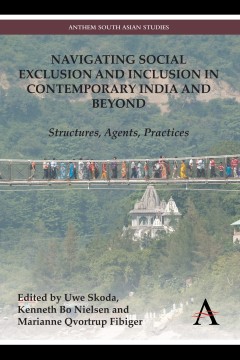Navigating Social Exclusion and Inclusion in Contemporary India and Beyond
Structures, Agents, Practices
Edited by Uwe Skoda
Kenneth Bo Nielsen
Marianne Qvortrup Fibiger
- About This Book
- Reviews
- Author Information
- Series
- Table of Contents
- Links
- Podcasts
About This Book
‘Navigating Social Exclusion and Inclusion in Contemporary India and Beyond’ examines the applicability of the concept of social exclusion in contemporary India, and addresses the following questions: How does an increasingly liberalised Indian economy contribute to processes of social inclusion and exclusion and to the reproduction of poverty and inequality? To what extent does the deepening of Indian democracy offer hitherto marginalised social groups new opportunities for pursuing strategies of inclusion? And how does ‘development’ alter the social terrain on which inequalities are negotiated? These and related discussions form the focal points of the volume. Importantly, the contributors deal explicitly with the simultaneity of processes of exclusion and inclusion, and with their entangled manifestation in social life. By applying the concept of social exclusion to concrete empirical case studies, the contributors expand conceptual horizons by keeping in mind that neither exclusion nor inclusion can be considered without its ‘alter ego’. The volume also challenges narrow conceptualisations of social inclusion and exclusion in terms of singular factors such as caste, policy or the economy. This collaborative endeavour and cross-disciplinary approach, which brings together younger and more established scholars, facilitates a deeper understanding of complex social and political processes in contemporary India.
Reviews
‘The genesis of the problem of exclusion and inclusion needs to be understood within a broad theoretical and conceptual framework, and with the help of empirical data. The essays in this book deal with this question. They explain with meticulous detail why we need to change our focus from state- and caste-centric discourses to a discourse that takes note of spaces, communities and resources. This volume presents an excellent collection of work.’ —Abhijit Dasgupta, Professor of Sociology, Delhi School of Economics, University of Delhi
‘This book offers rich and revealing empirical analyses of various Indian social relations based on the simple but heuristic concepts of exclusion and inclusion. The inclusion–exclusion dilemmas in social policy and social mobilizations are brought out in powerful ways.’ —Staffan Lindberg, Professor Emeritus of Sociology, Lund University
Author Information
Uwe Skoda is an associate professor of South Asian studies at Aarhus University, Denmark.
Kenneth Bo Nielsen is a research fellow at the Centre for Development and the Environment at the University of Oslo, Norway.
Marianne Qvortrup Fibiger is an associate professor in religious studies at Aarhus University, Denmark.
Series
Anthem South Asian Studies
Table of Contents
Acknowledgements; List of Contributors; 1. Introduction: Navigating Exclusion, Engineering Inclusion – Uwe Skoda and Kenneth Bo Nielsen; PART I: SPACES AND VALUES: 2. Cosmopolitanism or Iatrogenesis? Reflections on Religious Plurality, Censorship and Disciplinary Orientations – Kathinka Frøystad; 3. Dependent Husbands: Reflections on Marginal Masculinities – Radhika Chopra; 4. Exclusion and Inclusion: Navigation Strategies among Hindus in the Diaspora – A Case Study from Denmark – Marianne Qvortrup Fibiger; PART II: COMMUNITIES AND POLITICS: 5. In Search of Development: Muslims and Electoral Politics in an Indian State – Kenneth Bo Nielsen; 6. Exclusion as Common Denominator: Investigating ‘Dalit-hood’ – Guro W. Samuelsen; 7. Inclusion of the Excluded Groups through Panchayati Raj: Electoral Democracy in Uttar Pradesh – Satendra Kumar; 8. Making Sikkim More Inclusive: An Insider’s View of the Role of Committees and Commissions – Tanka B. Subba; 9. Encountering ‘Inclusion’ and Exclusion in Postindustrial Mumbai: A Study of Muslim Ex-millworkers’ Occupational Choices – Sumeet Mhaskar; PART III: RESOURCES AND DEVELOPMENT: 10. Dams, Development and the Exclusion of Indigenous Groups: A Case from Odisha – Deepak Kumar Behera; 11. ‘Solutions Emerge When Everyone Works Together’: Experiences of Social Inclusion in Watershed Management Committees in Karnataka – Devanshu Chakravarti, Sarah Byrne and Jane Carter; 12. The Death of Shankar: Social Exclusion and Tuberculosis in a Poor Neighbourhood in Bhubaneswar, Odisha – Jens Seeberg
Links
Stay Updated
Information
Latest Tweets



